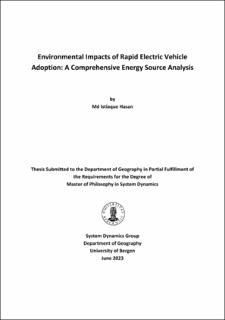| dc.description.abstract | The world is at a turning point, with major environmental problems demanding immediate action and the rapid adoption of renewable energy. Electric vehicles (EVs) have emerged as a possible alternative to reduce carbon emissions and dependence on conventional internal combustion engines in the face of growing worries about climate change and diminishing fossil fuel supplies. However, the topic of whether or not the broad adoption of EVs is actually viable without a comparable increase in the utilization of renewable energy is increasingly disputed. This paper examines the many viewpoints on the complex interaction between EV uptake and renewable energy sources. The international push toward EVs as a tool to battle climate change and accomplish sustainability objectives has widespread support among governments, manufacturers, and consumers. The environmental effect of EVs, however, is very variable depending on factors such as the kind of power used for charging, the manner of production, the disposal process, and so on. While EVs have many advantages, their widespread use raises questions about the long-term viability of the world's present energy mix, which still mainly depends on non-renewable sources like coal and natural gas. As the number of electric vehicles on the road increases, so does the need for power, making it more important than ever to build up renewable energy infrastructure at the same time. The increasing popularity of EVs provides a chance to stimulate investment in renewable energy projects, which in turn might spur innovation and lower the price of these projects. On the other hand, there are a few obstacles to overcome if widespread use of EVs occurs without concurrent growth in the use of renewable energy sources. First, if more people start using electric vehicles, the increased demand for energy to charge them might put a strain on power networks and increase the risk of supply problems and instability. The shift to EVs would be counterproductive if, to satisfy this increased demand, conventional power plants increased output, leading to an increase in greenhouse gas emissions. The environmental advantages of EV adoption may also be reduced if the majority of charging is done using power supplied from non-renewable sources. The long-term viability of the EV revolution is in doubt unless significant effort is made to expand the availability of renewable energy. Using system dynamics modeling and model simplification techniques, new insights into the electric and non-electric passenger car markets in the United States have been gleaned in this thesis. The goal of this thesis paper is to convey these understandings to a readership that is familiar with or is not familiar with SD. In order to determine the variation in emission and adoption rates, the thesis paper looks at several policies. With the goal of illuminating the dynamics at play throughout the shift from a fleet composed mostly of internal combustion cars to a more varied vehicle fleet. Users may try out potential policies that might hasten the spread of electric vehicles and examine the effects of changing the underlying model assumptions using this analytical tool. | |
